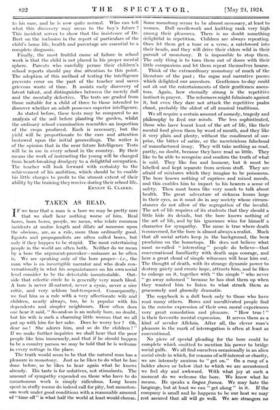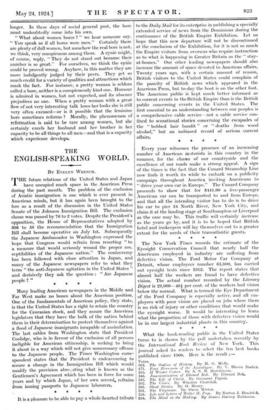TAKEN AS READ.
TF we hear that a man is a bore we may be pretty sure that we shall hear nothing worse of him. Real bores, born bores, people, we mean, who relate common incidents at undue length and dilate ad nauseam upon the obvious, are, as a rule, more than ordinarily good. Egoists and propagandists are often called bores, but only if they happen to be stupid. The most entertaining people in the world are often both. Neither do we mean by a bore the argument-provoker--nuisance as he often is. We are speaking only of the bore proper—i.e., the man who is an incorrigible narrator and who deals con- versationally in what his acquaintances on his own social level consider to be the detestable incontestable. Out- side that eclectic circle he is generally very much liked. A bore is never ill-natured, never a cynic, never a nice critic, and very seldom bad-tempered. Consequently, we find him as a rule with a very affectionate wife and children, nearly always, too, he is popular with his dependents and simpler neighbours. How often does one hear it said, "So-and-so is an unholy bore, no doubt, but his wife is such a charming little woman that we all put up with him for her sake. Does he worry her ? Oh, dear no ! She adores him, and so do the children ! " If we make further inquiries we shall hear that the poor people like him immensely, and that if he should happen to be a country parson we may be told that he is welcome in every cottage in the place. • The truth would seem to be that the natural man has a pleasure in monotony. Just as he likes to do what he has done before, so he likes to hear again what he knows already. His taste is for sedatives, not stimulants. The amount of sympathy expended on those who have to do monotonous work is simply ridiculous. Long hours spent in stuffy rooms do indeed call for pity, but monoton- ous work under good conditions with a reasonable amount of "time off" is what half the world at least would choose. Some monotony seems to be almost necessary, at least to women. Dull needlework and knitting rank very high among their pleasures. There is no doubt something delightful in repetition. Children are always repeating. Once let them get a tune or a verse, a catchword into their heads, and they will drive their elders wild in their pursuit of monotony. It is impossible to stop them. The only thing is to turn them out of doors with their little companions and let them repeat themselves hoarse.
Think of the extraordinary monotony of much of the literature of the past ; the sagas and narrative poems which delighted our ancestors. Gentlemen to-day could not sit out the entertainments of their gentlemen ances- tors. Again, how eternally strong is the repetitive instinct in prayer. The reformers might fulminate against it, but even they dare not attack the repetitive psalm chant, probably the oldest of all musical traditions.
We all require a certain amount of comedy, tragedy and philosophy to feed our minds. The less sophisticated, those who have learnt least of the art of life, like their mental food given them by word of mouth, and they like it very plain and plenty, without the condiment of sur- prise, the bitter of satire, or the meretricious falsehood of manufactured irony. They will take nothing as read, partly, no doubt, because they have read so little. They like to be able to recognize and confirm the truth of what is said. They like fun and humour, but it must be labelled and kept separate from serious stuff. They are afraid of mixtures which they imagine to be poisonous. The bore knows nothing of caprices _and mixed moods, and this enables him to impart to his hearers a sense of safety. Then most bores like very much to talk about health. The great adventure of sickness looms - large in their eyes, as it must do in any society whose circum- stances do not allow of the segregation of the invalid. The art of life requires of its students that they should a little hide its details, but the bore knows nothing of the art of life, and by his ignorance wins for himself a character for sympathy. The same is true where death is concerned, for the bore is almost always a realist. Much that all social artists keep in the background, the bozo proclaims on the housetops. He does not believe what most so-called " interesting " people do believe—that conversational familiarity with death saps courage, and here a great cloud of simple witnesses will bear him out. The thought of death, with its strange dynamic power to destroy gaiety and create hope, attracts him, and he likes to enlarge on it, together with "the simple" who never "go away ashamed" because he has shut them up when they wanted him to listen to what struck them as gruesomely and gloomily dramatic.
The copybook is a dull book only to those who have read many others. Bores and uncultivated people find in the concise expression of their own moral experiences very great consolation and pleasure. "How true ! " is their favourite mental expression. It serves them as a kind of secular Alleluia. After all, the clever man's pleasure in the mark of interrogation is often at least as conventional.
No piece of special pleading for the bore could be complete which omitted to mention his power to bridge social gulfs. We all find ourselves occasionally in an alien social circle in which, for reasons of self-interest or charity, we are intensely anxious to "get on." On a rung of a ladder above or below that to which we are accustomed we feel shy and awkward. With what joy at such a moment do we welcome the bore. We know what he means. He speaks a lingua franca. We may hate the language, but at least we can "get along" in it. If the company is small and he happens to be our host we may rest assured that all will go well. We are strangers no longer. . In these days of social general post, the bore must undoubtedly come into his own.
"What about women bores ? " we hear someone say. "You speak as if all bores were men." Certainly there are plenty of dull women, but somehow the real bore is not, we think, very conspicuous among them. A cynic might, of course, reply, "They do not stand out because their number is so great." For ourselves, we think the cynic could be proved wrong. Anyhow, in this matter they are more indulgently judged by their peers. They get so much credit for a variety of qualities and attractions which mask the fact. For instance, a pretty woman is seldom called a bore, neither is a conspicuously kind one. Humour is admired in women, but not expected, and its absence prejudices no one. When a pretty woman with a great flow of not very interesting talk loses her looks she is still very often excused—or is it possible that the feminine bore sometimes reforms? Morally, the phenomenon of reformation is said to be rare among women, but she certainly excels her husband and her brother in her capacity to be all things to all men—and that is a capacity which experience develops.











































 Previous page
Previous page